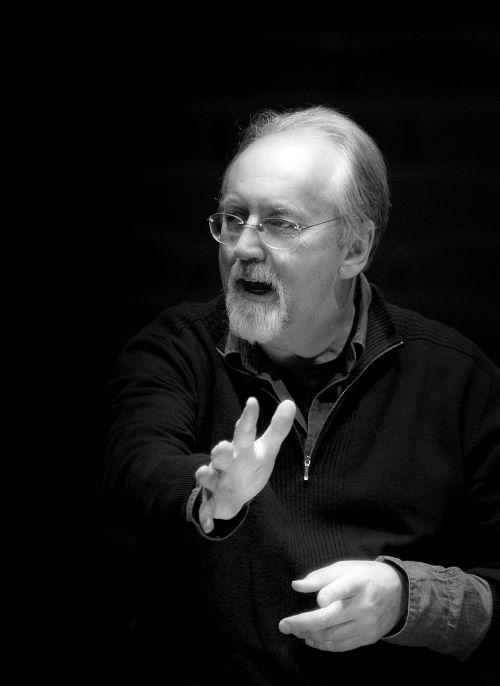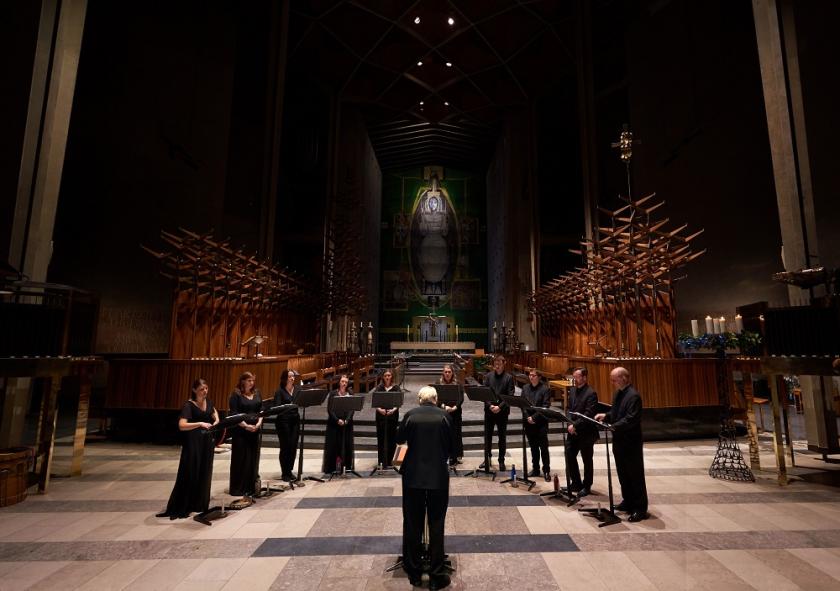As they celebrate their 50th year, Ex Cathedra have brought their much loved Christmas music by candlelight concerts to churches all across England, before giving five concerts in the run up to Christmas at St Paul’s in the Jewellery Quarter, in their home town of Birmingham. Singing to a packed-out Coventry cathedral on Monday night - Ex Cathedra’s first time there - was a group of ten from their consort of professional choral singers, who performed a mix of new carols and festive favourites.
Opening with founding director and conductor Jeffrey Skidmore’s arrangement of Hildegard von Bingen’s "Ave Generosa" the choir, each member of which held a candle, stealthily filed out to envelop the audience’s front rows from the sides of the church. A serene solo female voice was accompanied by a shimmering vocal pedal from the other singers, before they seamlessly moved into Thomas Tallis’s "Videte miraculum". Tallis’s polyphony was beautifully buoyed by the cathedral’s acoustic, setting the scene for the awe and mystery that’s at the heart of the Christmas story.
There were several works performed by Ex Cathedra’s composer-in-residence Alec Roth, the first of which - "Times and Seasons" - comes from his 2012 Cantata A Time to Dance, named after the well known biblical passage in Ecclesiastes. A pair of bells, rung by Skidmore, underpinned the tactus, like the chiming of a clock, reminding us of the constant passage of time, and with it, of course, the seasons. The choir were strong and convincing in "Men and Angels", Roth’s setting of George Herbert’s poem "Antiphon II", and the male voices gave some effective vocal drum rolls in his arrangement of the traditional French carol "Love will come again". The vocal percussion soon gave way to a tambour drum, played by one of the sopranos.
 This drum, along with the aforementioned bells, was the only instrument played throughout. Unless of course you count the water-filled wine glasses, which, when the singers carefully ran a finger round their rim, vibrated to produce a sparkling, ethereal quality for the beginning of Ēriks Ešenvalds’s 2011 carol "Stars".
This drum, along with the aforementioned bells, was the only instrument played throughout. Unless of course you count the water-filled wine glasses, which, when the singers carefully ran a finger round their rim, vibrated to produce a sparkling, ethereal quality for the beginning of Ēriks Ešenvalds’s 2011 carol "Stars".
Though the concert was mainly led by Skidmore (pictured right by Opera Omnia), whose fluent hand movements carefully shaped the music, much of the second half was directed by Associate Conductor Tori Longdon. Her conducting was deft and agile, as she directed the mellifluous vocal lines.
Groups of pieces were interspersed with readings reflecting on the Christmas period, the most effective of which was probably John Betjeman’s 1954 poem "Christmas", Its final verse, reflecting that the miracle of God being made man is a simple truth that renders all the decorations, hustle and bustle and Christmas shopping as totally obsolete, never loses its poingancy. It’s this festive spirit that was pertinent here. A joyful peace, away from the crowded shops, santa hats, busy streets and Christmas markets that can too often drown out the more contemplative side of the festive period.
The last item on the programme was a wonderfully serene rendition of JS Bach’s chorale "How shall I fitly meet Thee?", from his Christmas Oratorio, before Skidmore invited the audience to join in the hymn Of the Father’s love begotten. Its final verses - "Let no tongue on Earth be silent, Every voice in concert sing, Evermore and evermore" - were a perfectly fitting end to the evening.














Add comment